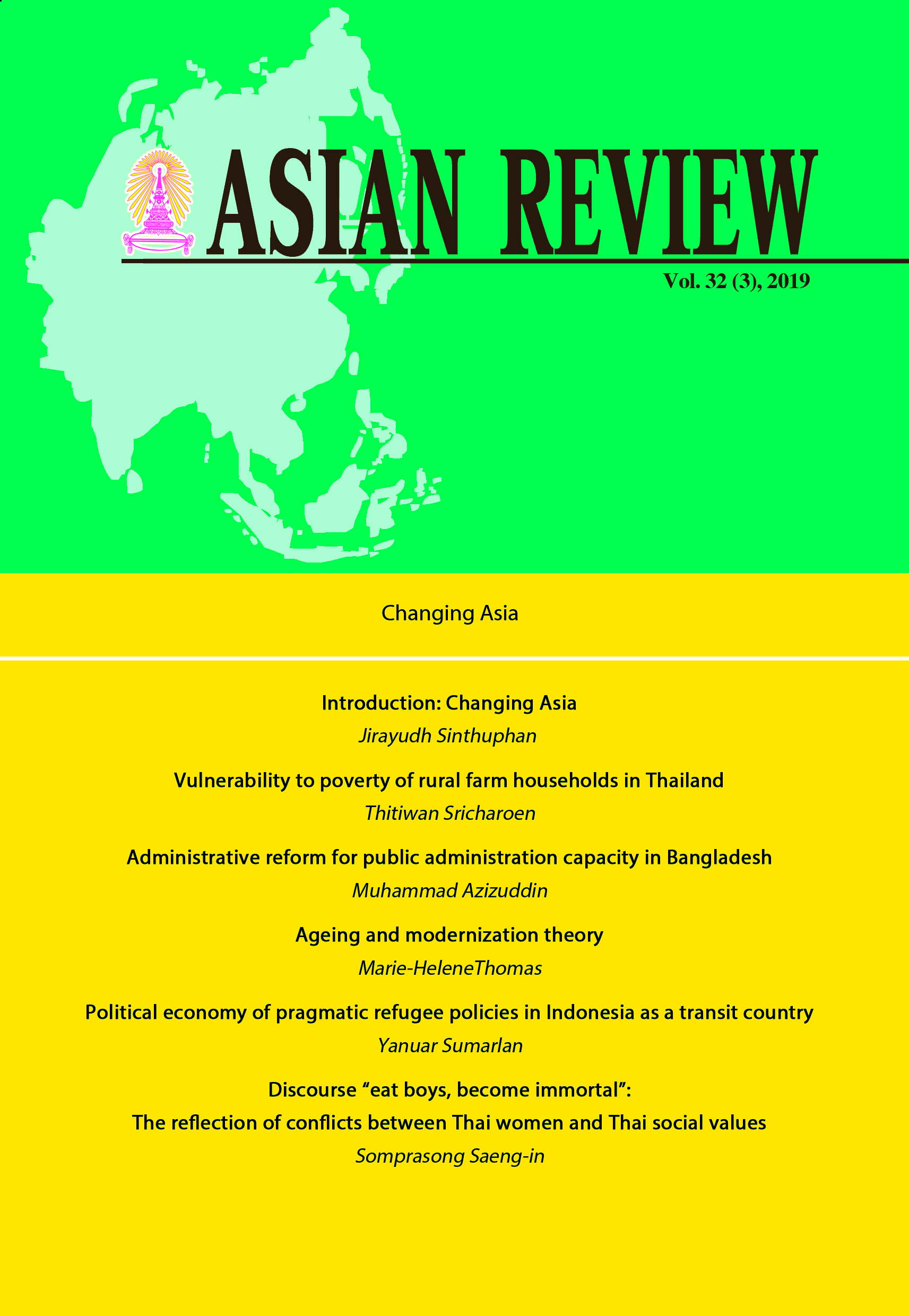Discourse “eat boys, become immortal”: The reflection of conflicts between Thai women and Thai social values
Keywords:
Thai woman, Thai social values, Thai culture, critical discourse analysisAbstract
This research aims at studying the discourses from various genres on the Internet containing the sentence “กินเด็ก เป็นอมตะ” (eat boys, become immortal) or the same meaning in order discover the conflicts between Thai women and social values. By using Critical Discourse Analysis in all examples, the following conflicts were found: A Thai woman should not love a younger man; Thai women should not be single; Thai women are not equal to men; Thai women can overpower men but it is inappropriate; Love between Thai women and younger men is materialistic and temporary; The discourses reflect the conflict of love in real life and
ideal love; Because of the fading boundary between love and sex, her thoughts and actions are different from the past.
References
Aungkhaphanichakij, Juntima. 2014. Discourse Analysis. Bangkok: Thammasat University.
Bunyanupharbphong, Supattra. 2005. Factors Related to Sexual Values of Teenagers in Bangkok Metropolitan. MA Thesis, Department of sex education, School of Graduate Studies Chulalongkorn University.
Chahongrum, Parnnee, et al. 2013. “Ideological Reproduction Relating Patriarchy in Textbooks at Primary School Levels.” Journal of Srinakarin Research
Ubon Ratchathani Rajabhat University 3(5): 11-27.
Chantavanich, Supang. 2014. Sociology Theory. 6th ed. Bangkok: Chulalongkorn University Press.
Jarernphorn, Sanor. 2005. Women and Society in the Literatures of Bubble Economy. Bangkok: Matichon Publishing.
Kantuwarn, Varee. 2004. “The Discourse: Thai Women and Changes.”. Journal of the Humanities and Social Sciences 21(2): 24-40.
Montrikul Na Ayuthaya, Boonwadee. 2016. “The Role of Women: A Perspective in Thai Social Justice.” Governance Journal Kalasin University 5(2): 23-37.
Nilpad, Jarinya. 1998. Relationship Between Media Exposure Behavior of Entertainment and Celebrities with Attitudes Toward Love and Sex of Adolescents
in Bangkok Metropolis. MA. Thesis. Faculty of Journalism and Mass Communication, Thammasat University.
Parnphothong, Nuttaporn. 2013. Critical Discourse Analysis in Linguistics: Concept and Introduction to Discourse in Thai Language. Bangkok: Academic Publishers Program, Department of Literature, Chulalongkorn University.
Phanich, Auyporn. 1998. “Women and Language.” In Project Feminist Studies 1 “Women and Issues.”, edited by Office of the Permanent Secretary, Prime
Minister Office, 252-283. Bangkok: Lad Phrao Council of Teachers Printing.
Poonsri, Ranwarat. 2010. Happiness of Elderly Woman in Thai Novels, 1982-2009. MA. Thesis, Faculty of Arts, Chulalongkorn University.
Sangkhapanthanon, Thanya. 2016. Contemporary Literary Theory. Pathumthani: Nakorn Publishing.
Singnoi, Unchalee. 2006. “Eating Terms: What the Category Reveals about the Thai Mind.” MANUSYA: Journal of Humanities 9(1): 82-100.
Sinlapasuwan, Pimparn. 1993. Factors Affecting Sexual Behavior among Young Female Factory Workers in Bangkok and Vicinities. Ph.D. diss, Department
of Population Studies, Graduate School, Mahidol University
Downloads
Published
How to Cite
Issue
Section
License
Published articles are under the copyright of the Instiute of Asian Studies, Chulalongkorn University. Partially or totally publication of an article elsewhere is possible only after the consent from the editors.







